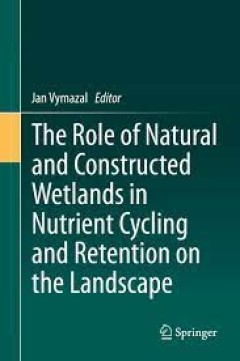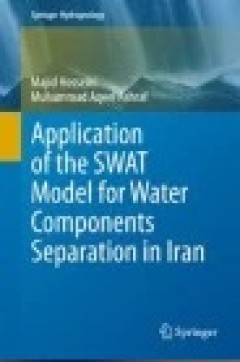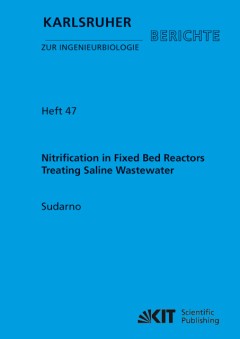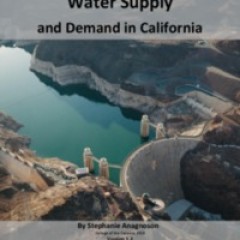Filter by

The Role of Natural and Constructed Wetlands in Nutrient Cycling and Retentio…
Natural and constructed wetlands play a very important role on the landscape and their ecological services are highly valuable. In fact, some wetland types are regarded as one of the most valuable ecosystems on the Earth. Water management, including flood water retention, biomass production, carbon sequestration, wastewater treatment and biodiversity sources, are among the most important ecolog…
- Edition
- -
- ISBN/ISSN
- 978-3-319-08177-9
- Collation
- -
- Series Title
- -
- Call Number
- -

Application of the SWAT Model for Water Components Separation in Iran
Water balance studies for large and small river basins are the subject of this book. Here, the specific focus is on the soil and water assessment tools (SWAT) model coupled with geographic information system (GIS) remote sensing data for a comprehensive study. Some books available in the market provide an overview of different hydrological models for water balance but not specifically for the S…
- Edition
- Ed. 1
- ISBN/ISSN
- 978-4-431-55564-3
- Collation
- X, 105
- Series Title
- Springer Hydrogeology
- Call Number
- 551.48 HOS a

The Rasputin Effect: When Commensals and Symbionts Become Parasitic
This volume focuses on those instances when benign and even beneficial relationships between microbes and their hosts opportunistically change and become detrimental toward the host. It examines the triggering events which can factor into these changes, such as reduction in the host’s capacity for mounting an effective defensive response due to nutritional deprivation, coinfections and seemi…
- Edition
- -
- ISBN/ISSN
- 978-3-319-28170-4
- Collation
- XII, 357
- Series Title
- Advances in Environmental Microbiology
- Call Number
- -

The Physiology of Microalgae
It has been over 40 years since the publication of a book on algal physiology. Apart from reviews and chapters no other comprehensive book on this topic has been published. Research on microalgae has expanded enormously since then, as has the commercial exploitation of microalgae. This volume thoroughly deals with the most critical physiological and biochemical processes governing algal growth …
- Edition
- -
- ISBN/ISSN
- 978-3-319-24945-2
- Collation
- X, 681
- Series Title
- Developments in Applied Phycology
- Call Number
- -

Integrated Water Resources Management: Concept, Research and Implementation
This book reviews the concept, contemporary research efforts and the implementation of Integrated Water Resources Management (IWRM). The IWRM concept was established as an international guiding water management paradigm in the early 1990ies and has become a vital approach to solving the problems associated with the topic of water. The book summarizes fourteen comprehensive IWRM research project…
- Edition
- -
- ISBN/ISSN
- 978-3-319-25071-7
- Collation
- -
- Series Title
- -
- Call Number
- -

Nitrification in Fixed Bed Reactors Treating Saline Wastewater
Two fixed bed reactors for nitrification with either polyethylene/clay sinter lamellas (FBR A) or porous ceramic rings (FBR B) were continously run for treating synthetic saline wastewater. Seawater from Hafen Büsum was used as an inoculums. The performance of the system was evaluated under different operating conditions. A better overall nitrification without nitrite accumulation was observed…
- Edition
- -
- ISBN/ISSN
- 978-3-86644-691-5
- Collation
- -
- Series Title
- -
- Call Number
- 628.168 SUD n

Marine Anthropogenic Litter
This book describes how man-made litter, primarily plastic, has spread into the remotest parts of the oceans and covers all aspects of this pollution problem from the impacts on wildlife and human health to socio-economic and political issues. Marine litter is a prime threat to marine wildlife, habitats and food webs worldwide. The book illustrates how advanced technologies from deep-sea resea…
- Edition
- -
- ISBN/ISSN
- 978-3-319-16510-3
- Collation
- -
- Series Title
- -
- Call Number
- -

Marine Anthropogenic Litter
This book describes how man-made litter, primarily plastic, has spread into the remotest parts of the oceans and covers all aspects of this pollution problem from the impacts on wildlife and human health to socio-economic and political issues. Marine litter is a prime threat to marine wildlife, habitats and food webs worldwide. The book illustrates how advanced technologies from deep-sea res…
- Edition
- -
- ISBN/ISSN
- 978-3-319-16510-3
- Collation
- -
- Series Title
- -
- Call Number
- -

Water Supply and Demand in California
You’re about to understand water demand and water supply more deeply. This understanding is going to change how you look at your water bill, grass in your yard and around town, and all those canals you see while driving around in California. Understanding the connection between demand and supply is critical to anyone working in the water industry today. Water demand is our need and use of wa…
- Edition
- -
- ISBN/ISSN
- -
- Collation
- -
- Series Title
- -
- Call Number
- 627 ANA w

Virtuous Waters : Mineral Springs, Bathing, and Infrastructure in Mexico
Virtuous Waters is a pathbreaking and innovative study of bathing, drinking and other everyday engagements with a wide range of waters across five centuries in Mexico. Casey Walsh uses political ecology to bring together an analysis of shifting scientific, religious and political understandings of waters and a material history of social formations, environments, and infrastructures. The book sh…
- Edition
- -
- ISBN/ISSN
- 9780520291737
- Collation
- -
- Series Title
- -
- Call Number
- 551 WAL v
 Computer Science, Information & General Works
Computer Science, Information & General Works  Philosophy & Psychology
Philosophy & Psychology  Religion
Religion  Social Sciences
Social Sciences  Language
Language  Pure Science
Pure Science  Applied Sciences
Applied Sciences  Art & Recreation
Art & Recreation  Literature
Literature  History & Geography
History & Geography